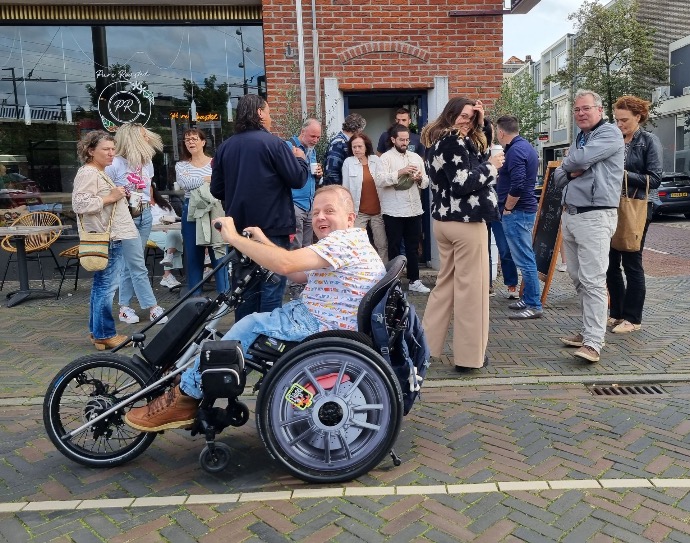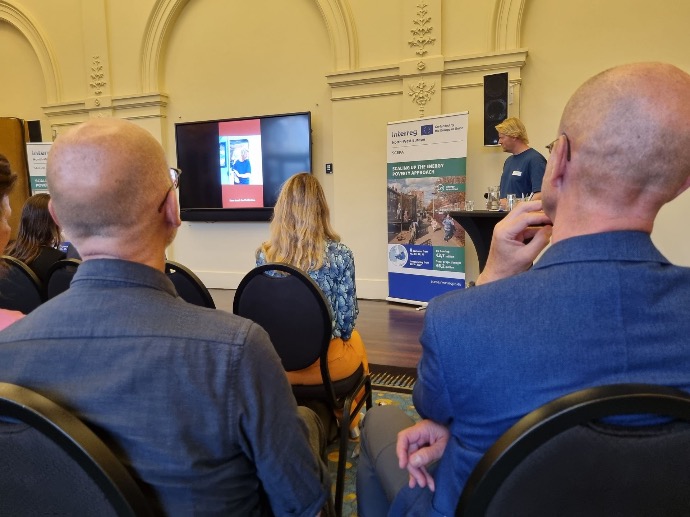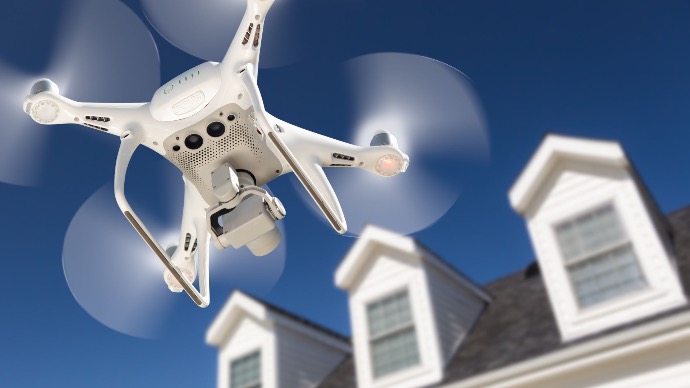WVI Mobile Energy House
The WVI Mobile Energy House is off to a great start in Wingene, aiming to improve energy efficiency and renovation rates in West Flanders. "Not all citizens easily find their way to the WVI Energy House," says Geert Sanders, General Director of WVI. "With the Mobile Energy House, we bring our renovation experts directly to the people, offering free, objective, and reliable advice on energy savings and home renovations."
This initiative supports Flanders' Renovation Pact, with the goal of making all homes energy-efficient by 2050. Currently, only 8% of homes meet this standard. "Energy efficiency benefits everyone by reducing energy bills and environmental impact," says Alderman Brecht Warnez.
Thanks to European subsidies from the Interreg North-West Europe program and the SCEPA project, the Mobile Energy House aims to combat energy poverty in collaboration with partners from Belgium, the Netherlands, France, and Ireland.
For more information, visit www.wvi.be/scepa-samen-tegen-energiearmoede

Introducing SCEPA's Community of Interest (CoI)
The SCEPA Community of Interest is twofold: to create a learning environment at European level to exchange best practices and knowledge about impactful initiatives addressing energy poverty; as well as to raise awareness on the topic in the project countries and beyond, leveraging community support and engagement around the energy poverty debate.
The creation of our Community follows a multi level governance and intersectoral approach, targeting relevant stakeholders representative of those potential private and public sectors that could bring an added value and contribution to the SCEPA mission. As an example: SMEs, financial institutions, civil society organizations, academic institutions, national regional and local public authorities, social group communities etc.
Community members will be mapped starting from SCEPA partners networks and countries of implementation. Then, a second level of mapping is foreseen, namely a call for interest will be launched at European level addressing those interested to get to know more about energy poverty and being the SCEPA ambassador in their local communities.
These actions allow the opportunity for replication and transferability of SCEPA results and impact; as well as to raise awareness on the topic in the project countries and beyond raising community support and engagement around the energy poverty debate.



Kick-off SCEPA: Positive energy in Arnhem (NL)
On the 20th and 21st September 2023 the European project SCEPA, Scaling Up The Energy Poverty Approach, kicked off with great enthusiasm in Arnhem (NL), where European partners gathered to learn from each other and enhance their efforts in tackling energy poverty. As the leading partner in the project, Arnhem welcomed Vice Mayor Cathelijne Bouwkamp, who extended a warm welcome to all guests.
Energy poverty has emerged as a critical challenge, acknowledged by the European Commission as an urgent task for the EU. Recent geopolitical events have led to record-high energy prices, exacerbating the issue and affecting up to 125 million citizens, according to EU surveys in 2021. Recognizing the severity of the situation, SCEPA aims to contribute to a just and inclusive energy transition by engaging more vulnerable households and alleviating energy poverty.
With over 3.5 million households currently experiencing energy poverty in the NWE partner areas, SCEPA adopts a collaborative approach to address the issue. Instead of reinventing the wheel, the project gathers and enhances existing effective energy poverty approaches, promoting shared learning and best practices. The development of a Joint Action Strategy (JAS) is a key focus, providing nuanced details on what works for specific target groups in particular residential areas within the NWE.
The JAS serves as a foundation for the creation of Local Action Plans in partner regions and cities. Through the implementation of pilot activities, which encompass three types of pilots with 12 interventions, SCEPA aims to reach over 105,000 households. Monitoring and evaluation play a crucial role in updating the JAS and sharing it with SCEPA's community of interest for replication. This collaborative approach ensures that vulnerable households, public authorities, and organizations beyond the SCEPA consortium can benefit from effective energy poverty solutions.
The positive energy and commitment were palpable during the SCEPA kick-off event in Arnhem, setting the stage for fruitful collaboration and impactful initiatives. The launch event included visits to locations in the city where successful approaches to energy poverty were already making a visible difference. As discussions continue at Musis Sacrum in Arnhem, the project is poised to make a meaningful contribution to the broader European efforts to address and alleviate energy poverty. The SCEPA consortium is laying the groundwork for a more sustainable and inclusive energy future, with the potential to create positive ripple effects across the continent.
Press Release SCEPA
EU supports scaling up energy poverty approaches with Interreg subsidy
The EU recently allocated an ERDF subsidy to the Interreg North-West Europe (NWE) project ‘SCEPA’. SCEPA is short for ‘Scaling up the Energy Poverty Approach’ and the main objective of this project is to reduce and alleviate energy poverty by engaging and empowering vulnerable households. The project duration is 4 years, and the total project budget is € 6,3 million. SCEPA launched in April 2023.
Energy poverty occurs when energy bills represent a high percentage of consumers' income, or when they must reduce their household's energy consumption to a degree that negatively impacts their health and well-being. Within NWE (excl. Switzerland) over 3.5 mil. Households (2021) are found to suffer from energy poverty and the number is rising. It has been deemed a major challenge by the European Commission. Proven measures to alleviate energy poverty are available but are often only applied under local conditions and not suitable for uptake to reach the - growing - target of vulnerable households and the organisations that support them. Especially hard-to-reach vulnerable households require tailor-made approaches.
Instead of reinventing the wheel, SCEPA gathers and enhances existing effective energy poverty approaches in order to be able to upscale initiatives. SCEPA consists of three pilot groups, namely: awareness and behavioral change (1), energy communities (2), and technical measures (3).
SCEPA consists of 5 types of organisations:
- Local & regional public authorities: Mun. of Arnhem (NL) -LEAD PARTNER-; Mun. of Leeuwarden (NL); Mun. of Liege (BE - Wallonia); West Vlaamse Intercommunale (BE - Flanders);
- Regional energy and sectoral agencies: South-East Energy Agency (IE); Agence Parisienne du Climat (FR);
- Research institute: HAN University of Applied Sciences (NL);
- Network organization: European Association for Local democracy ALDA (FR);
- Associate organisations: Klimaatverbond (NL); Ministry of the Interior (NL); Plymouth (UK), LOGO Brugge-Oostende (BE); Verbraucherzentrale Rheinland-Pfalz (DE); REScoop.eu; REScoop Wallonie (BE); Rassemblement des Associations de Promotion du Logement (RAPeL) ASBL.
These partners work intensively with their 'local partners' to support the households.
Highlighting the Partners: WVI
The West-Vlaamse Intercommunale (WVI) is a service rendering public association working for 54 municipalities in the province of West-Flanders. WVI develops and manages business parks and is active in housing projects. Besides that it provides its municipalities with advice and studies concerning spatial planning, environment, renewable energy, climate actions, nature and mobility.
WVI is recognised as an Energy House. The Energy House gives renovation advice and guidance to vulnerable consumers. It’s an established provider of energy loans and also assists consumers in applying for other loans and grants. By providing energy scans and home visits to the vulnerable target audience, the Energy House tries to help them to reduce energy consumption and to improve the energy efficiency of their houses.
In the work area of WVI’s Energy House a lot of the inhabitants are affected by energy poverty. Their number is constantly rising. The Energy House of WVI aims to further expand its strong focus on vulnerable citizens and wants to reach new target groups to combat energy poverty.
Therefore, in SCEPA an Energy Van will be deployed, where citizens can get free energy and renovation information and advice. The Van will particularly visit municipalities and neighbourhoods with a higher chance or incidence of energy poverty.
Additionally, a Thermodrone will be used to do a deeper, more thorough screening of neighbourhoods and aging apartment buildings.
By being present locally with the Energy Van and by live broadcasting thermographic images of roofs and facades, showing the often considerable energy losses, WVI wants to support and activate the often hard to reach target groups.

